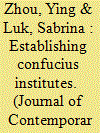| Srl | Item |
| 1 |
ID:
145889


|
|
|
|
|
| Summary/Abstract |
Soft power has become China’s new diplomatic tool to spread its influence in today’s changing international landscape. The establishment of Confucius Institutes (CIs) since 2004 to promote the understanding of Chinese language and culture is a striking example of how the government promotes soft power through cultural means. Through the macro- and micro-level analysis of CIs, this study shows that CIs fail to increase the soft power of China because many countries regard CIs as a propaganda tool and a threat to academic freedom and the local community. It shows that China’s soft power is not so attractive in the eyes of receivers. In fact, China’s aggressive cultural initiatives through the establishment of CIs have triggered another version of the ‘China threat’.
|
|
|
|
|
|
|
|
|
|
|
|
|
|
|
|
| 2 |
ID:
182772


|
|
|
|
|
| Summary/Abstract |
This paper estimates the effect of the “selective two-child” policy (The “selective two-child” policy allowed couples to have two children if one member of the couple was an only child (1-OC family)). on the resource allocation between generations amongst urban households in China by referring to the nationally representative China Household Finance Survey (CHFS). The results of propensity score matching (PSM) and difference-in-difference (DID) show that the total and per capita expenditures on children education are reduced significantly after the implementation of the “selective two-child” policy, testifying to the quantity-quality trade-off of children in Chinese families. Nevertheless, the financial support for the elderly not living in the household does not decrease, suggesting no intergenerational competition. Furthermore, the total and per capita expenditures for the qualified families decreased significantly, which indicates that the loosening of fertility policy may lead to new-oriented and unintended precautionary saving motives.
|
|
|
|
|
|
|
|
|
|
|
|
|
|
|
|
| 3 |
ID:
136281


|
|
|
|
|
| Summary/Abstract |
This paper is motivated by the recent debate on the existence and scale of China's ‘Guo Jin Min Tui’ phenomenon, which is often translated as ‘the state sector advances and the private sector retreats’. We argue that the profound implication of an advancing state sector is not the size expansion of the state ownership in the economy per se, but the likely retardation of the development of the already financially constrained private sector and the issues around the sustainability of the already weakening Chinese economy growth. Drawing on recent methodological advances, we provide a critical analysis of the contributions of the state and non-state sectors in the aggregate Total Factor Productivity and its growth over the period of 1998–2007 to verify the existence of GJMT and its possible impacts on Chinese economic growth. Overall, we find strong and consistent evidence of a systematic and worsening resource misallocation within the state sector and/or between the state sectors and private sectors over time. This suggests that non-market forces allow resources to be driven away from their competitive market allocation and towards the inefficient state sector.
|
|
|
|
|
|
|
|
|
|
|
|
|
|
|
|